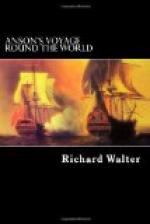(**Note. Anson’s squadron was then at St. Catherine’s in Brazil. See below, Chapter 3.)
(***Note. The Spanish squadron when it sailed from Maldonado consisted of the following ships: “Asia”, 66 guns, flag ship; “Guipuscoa”, 74; “Hermiona”, 54; “Esperanza”, 50; “St. Estevan”, 40. The Asia was the only ship that ever returned to Spain.)
Pizarro with his squadron having, towards the latter end of February, run the length of Cape Horn, he then stood to the westward in order to double it; but in the night of the last day of February, OS. while, with this view, they were turned to windward the Guipuscoa, the Hermiona, and the Esperanza were separated from the Admiral. On the 6th of March following the Guipuscoa was separated from the other two, and on the 7th (being the day after we had passed straits le Maire) there came on a most furious storm at north-west, which, in despite of all their efforts, drove the whole squadron to the eastward, and obliged them, after several fruitless attempts, to bear away for the River of Plate, where Pizarro in the Asia arrived about the middle of May and a few days after him the Esperanza and the St. Estevan. The Hermiona was supposed to founder at sea for she was never heard of more and the Guipuscoa was run ashore and sunk on the coast of Brazil. The calamities of all kinds which this squadron underwentin this unsuccessful navigation can only be paralleled by what we ourselves experienced in the same climate when buffeted by the same storms. There was indeed some diversity in our distresses which rendered it difficult to decide whose situation was most worthy of commiseration; for to all the misfortunes we had in common with each other as shattered rigging, leaky ships, and the fatigues and despondency which necessarily attend these disasters, there was superadded on board our squadron the ravage of a most destructive and incurable disease* and on board the Spanish squadron the devastation of famine.
(Note. Scurvy.)
Famine.
For this squadron departed from Spain as has been already observed with no more than four months’ provision and even that, as it is said, at short allowance only, so that, when by the storms they met with off Cape Horn their continuance at sea was prolonged a month or more beyond their expectation they were thereby reduced to such infinite distress that rats, when they could be caught, were sold for four dollars a piece and a sailor who died on board had his death concealed for some days by his brother who during that time lay in the same hammock with the corpse only to receive the dead man’s allowance of provisions.
By the complicated distress of fatigue, sickness, and hunger, the three ships which escaped lost the greatest part of their men. The Asia, their Admiral’s ship, arrived at Monte Video in the River of Plate with half her crew only; the St. Estevan had lost in like manner half her hands when she anchored in the Bay of Barragan. The Esperanza, a 50-gun ship, was still more unfortunate, for of 450 hands which she brought from Spain only 55 remained alive.




